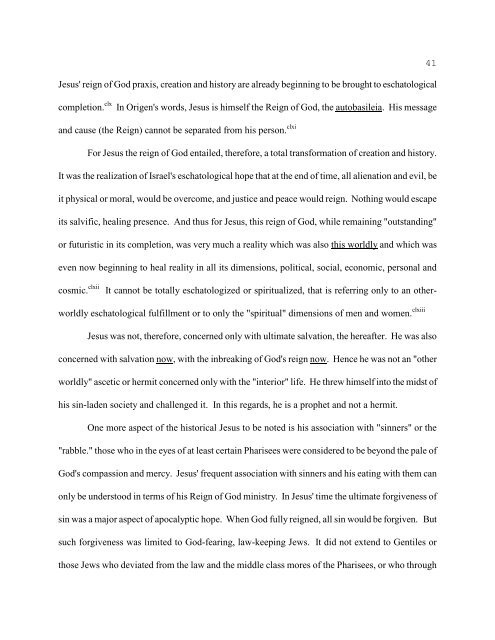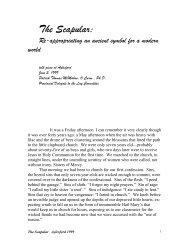Christocentrism of Charism – Buggert - CarmelStream
Christocentrism of Charism – Buggert - CarmelStream
Christocentrism of Charism – Buggert - CarmelStream
Create successful ePaper yourself
Turn your PDF publications into a flip-book with our unique Google optimized e-Paper software.
Jesus' reign <strong>of</strong> God praxis, creation and history are already beginning to be brought to eschatological<br />
completion. clx In Origen's words, Jesus is himself the Reign <strong>of</strong> God, the autobasileia. His message<br />
and cause (the Reign) cannot be separated from his person. clxi<br />
For Jesus the reign <strong>of</strong> God entailed, therefore, a total transformation <strong>of</strong> creation and history.<br />
It was the realization <strong>of</strong> Israel's eschatological hope that at the end <strong>of</strong> time, all alienation and evil, be<br />
it physical or moral, would be overcome, and justice and peace would reign. Nothing would escape<br />
its salvific, healing presence. And thus for Jesus, this reign <strong>of</strong> God, while remaining "outstanding"<br />
or futuristic in its completion, was very much a reality which was also this worldly and which was<br />
even now beginning to heal reality in all its dimensions, political, social, economic, personal and<br />
cosmic. clxii It cannot be totally eschatologized or spiritualized, that is referring only to an other-<br />
worldly eschatological fulfillment or to only the "spiritual" dimensions <strong>of</strong> men and women. clxiii<br />
Jesus was not, therefore, concerned only with ultimate salvation, the hereafter. He was also<br />
concerned with salvation now, with the inbreaking <strong>of</strong> God's reign now. Hence he was not an "other<br />
worldly" ascetic or hermit concerned only with the "interior" life. He threw himself into the midst <strong>of</strong><br />
his sin-laden society and challenged it. In this regards, he is a prophet and not a hermit.<br />
One more aspect <strong>of</strong> the historical Jesus to be noted is his association with "sinners" or the<br />
"rabble." those who in the eyes <strong>of</strong> at least certain Pharisees were considered to be beyond the pale <strong>of</strong><br />
God's compassion and mercy. Jesus' frequent association with sinners and his eating with them can<br />
only be understood in terms <strong>of</strong> his Reign <strong>of</strong> God ministry. In Jesus' time the ultimate forgiveness <strong>of</strong><br />
sin was a major aspect <strong>of</strong> apocalyptic hope. When God fully reigned, all sin would be forgiven. But<br />
such forgiveness was limited to God-fearing, law-keeping Jews. It did not extend to Gentiles or<br />
those Jews who deviated from the law and the middle class mores <strong>of</strong> the Pharisees, or who through<br />
41



